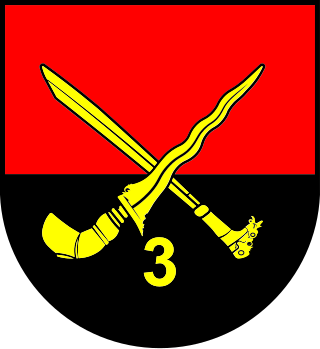This is a list of British ground forces in the Falklands War. For a list of ground forces from Argentina, see Argentine ground forces in the Falklands War

The Royal Ranger Regiment is an infantry regiment of the Malaysian Army. Although it is second in seniority to the Royal Malay Regiment, the RRD can trace its origins back to the mid 19th century and the establishment of The Sarawak Rangers, the peacekeeping force in the Sarawak region. This force was absorbed by the Sarawak Constabulary in 1932, but the name was revived in 1941 as a British Colonial unit; this unit commanded by British Lieutenant Colonel C.M. Lane was captured by the Japanese in 1942.

The Parachute Regiment is an airborne and special forces regiment of the Indian Army. It was raised in 1945 as part of the British Indian Army but was disbanded after World War II and was re-raised in 1952 as part of the Indian Army. Currently it consists of fifteen Special Forces, two Territorial Army and one Rashtriya Rifles battalions.

The Malaysian Army is the land component of the Malaysian Armed Forces. Steeped in British Army traditions, the Malaysian Army does not carry the title ‘royal’ as do the Royal Malaysian Navy and the Royal Malaysian Air Force. Instead, the title is bestowed on selected army corps and regiments who have been accorded the honour by the Yang di-Pertuan Agong, who is the Supreme Commander of the Malaysian Armed Forces.

The Rejimen Askar Wataniah is the military reserve force of the Malaysian Army.

The 10th Parachute Brigade, commonly known as 10 Para, is an elite brigade-sized airborne unit within the Malaysian Army tasked with being rapidly deployed inside or outside the boundaries of Malaysia. 10 Para is the key element of the Rapid Deployment Force.

The 5th Infantry Brigade was a regular infantry brigade of the British Army that was in existence since before the First World War, except for a short break in the late 1970s. It was an Airborne Brigade from the early 1980s until amalgamating with 24th Airmobile Brigade, in 1999, to form 16 Air Assault Brigade.

Lieutenant General Sagat Singh, PVSM was a General Officer in the Indian Army notable for his participation in liberation of Goa and later in Bangladesh. He held many commands and staff appointments throughout his military career.

The maroon beret in a military configuration has been an international symbol of airborne forces since the Second World War. It was first officially introduced by the British Army in 1942, at the direction of Major-General Frederick "Boy" Browning, commander of the British 1st Airborne Division. It was first worn by the Parachute Regiment in action in North Africa during November 1942.
The Indian Army had no standby force ready in 1971 with the specific task of attacking East Pakistan, one of the many reasons why India did not immediately intervene after Pakistan launched Operation Searchlight in March 1971. Indian Army's Eastern Command was tasked with defending the northern and eastern borders and fighting the insurgencies in Nagaland, Mizoram and Naxalites in West Bengal at that time.

The 50th Parachute Brigade is a brigade-sized formation of the Indian Army. Its main force is formed of battalions of the Parachute Regiment. It consists of 2 Airborne battalions, supported by units of the Regiment of Artillery, the Corps of Engineers and a Para field hospital.

Terendak Camp is a Malaysian Army military base located in Sungai Udang, Central Melaka District, Melaka, Malaysia. It belonged to the Commonwealth of Nations before being handed over to the Malaysian Armed Forces in 1970. It is right next to the Sungai Udang Camp.

The 8th Battalion (Parachute), Royal Ranger Regiment (Malay: Batalion ke-8 Rejimen Renjer Diraja (Para)), better known as the 8 RRD or 8 RRD (Para) – abbreviation from its local name, is a battalion-sized airborne infantry from the Royal Ranger Regiment of the Malaysian Army. On 10 October 1994 the 8 RRD became part of the 10th Parachute Brigade. The 8 RRD is the first infantry unit in the Malaysian Army transformed from a conventional to an airborne unit.

The 10th Squadron (Parachute), Royal Army Engineers Regiment is a company-sized airborne sapper from the Malaysian Army's Royal Army Engineers Regiment. 10 SQN RAER (Para) has been a part of the 10th Parachute Brigade since 10 October 1994 and is tasked with providing engineering support to the brigade.

The 3rd Infantry Division is a division-sized combined arms formation of the Malaysian Army. Its headquarters are in Terendak Camp, Malacca, and it is in charge of defending the south of the Malay peninsula, which includes Malacca, Negeri Sembilan, Johor, and Pahang.
The 9th Battalion (Parachute), Royal Malay Regiment (Malay: Batalion ke-9, Rejimen Askar Melayu Diraja (Payung Terjun)), abbreviated 9 RAMD (Para) from its local name, is a battalion-sized airborne infantry unit of the Malaysian Army's Royal Malay Regiment. Since 10 October 1994, 9 RAMD has been a part of the 10th Parachute Brigade.
The Medical Company (Parachute), Royal Medical and Dental Corps, also known as Para Viper or abbreviated KPP from its local name, is a company-sized airborne combat medic unit of the Malaysian Army's Royal Medical and Dental Corps. It has been a part of the 10th Parachute Brigade since 1994 and is responsible for providing medical support to the brigade.

The 11th Strategic Division, stylized XI Division, was a division-sized combat formation of the Malaysian Army.
The 18th Battalion (Parachute), Royal Malay Regiment (Malay: Batalion ke-18, Rejimen Askar Melayu Diraja (Payung Terjun)), abbreviated 18 RAMD (Para) from its local name, is a battalion-sized airborne infantry unit of the Malaysian Army's Royal Malay Regiment. The 18 RAMD is the newest conventional infantry unit to be promoted to an airborne unit, and they have now officially been part of the Malaysian Army's elite 10 Parachute Brigade since 21 February 2018.













